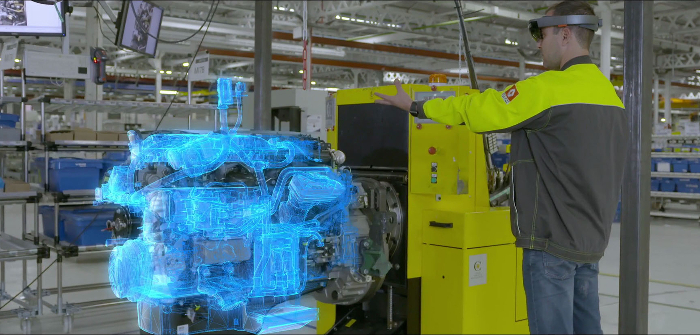Already an exponent of VR technology, Renault Trucks, in collaboration with Immersion the European leader in both VR and augmented reality is now evaluating the potential of mixed reality to deliver a new, faster and more reliable quality control process at its Lyon engine manufacturing site.
The partnership with a multidisciplinary team of 20 employees, which is set up in a similar fashion to a startup and benefits from an internal incubator, has designed a mixed reality prototype in an attempt to improve engine quality control.
Unlike augmented reality, which displays information on top of reality, both laid flat and on screens, mixed reality can add virtual objects into a real environment in the form of holograms, with which users can interact.
“In practice, quality control operators will wear Microsoft HoloLens smartglasses in which all the digitized engine parts will be integrated,” explained Bertrand Félix, the Renault Trucks engineer behind this project.
“Via the glasses and mixed reality interface, operators will see decision-making instructions that will guide them through the most complex control operations. At the moment, operators working on control points are still using paper instructions.”
Each of the engine parts, which are digitized and superimposed over the actual engine, can be viewed separately, guiding operators toward specific parts and validating quality process stages one-by-one.
By keeping their hands free, operators can also be sent additional decision-making information, such as plans, verification and assembly instructions. As well as enabling users to move around the engine thanks to numerous embedded sensors.
“In addition to the expertise we have been acquiring in virtual reality since 1994, our added value lies in our multidisciplinary team that really understands needs and uses in order to offer our customers a global experience,” explained Jean-Baptiste de la Rivière, innovation director at Immersion.
“With Renault Trucks, we have designed and developed a tool that is perfectly suited to the requirements of the factory, which can be integrated into the manufacturer’s industrial processes.”
The result meets expectations a high-performance solution that meets the requirements of Renault Trucks factories, both in terms of quality and agility.
Renault Trucks sees considerable advantages in this technology, as use of mixed reality both reduces and improves quality control operations. It also reduces the cognitive load of operators and accelerates their training. Other applications may be envisaged in a second stage, such as assistance with assembly or repair.
Renault Trucks has set itself the challenge of developing a paper-free, digitized manufacturing process. It is envisaged that the mixed reality prototype will be rolled out around 2019.


